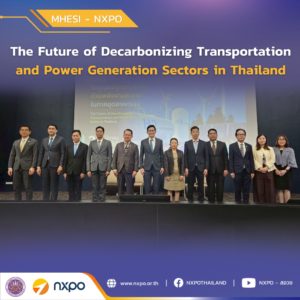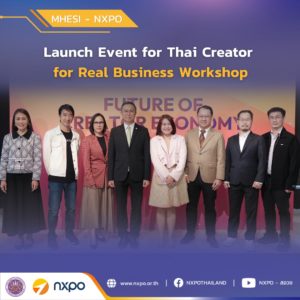Dr. Siree Chaiseri, Director of Program Management Unit for National Competitiveness Enhancement (PMU-C) recently discussed the PMU-C’s work in 2020. PMU-C has a task to utilize technology and innovation to improve competitiveness of Thai industry and create economic and environmental sustainability. Its scope covers the following areas: 1) agriculture and food, 2) wellness and medicine, 3) tourism and creative economy, 4) energy, biochemical and biomaterial, 5) digital platform, 6) circular economy, and 7) area-based BCG. Additionally, to facilitate the advancement of research to market, Technology Localization Program is designed to finance research at TRL 5 stage and up, prototype development and localization of imported technology. The unit also supports work in deep science & technology and strengthens the national quality infrastructure (NQI). Public Private Partnership-Innovation Driven Enterprise (PPP-IDEs) is a program designed to encourage SMEs and IDEs to engage in government-demand research, whereas Global Partnership Program supports projects that involve the transfer of knowledge and technology with international partners.

In 2020, a 3.17 billion THB budget was allocated to PMU-C. Of this budget, 561.93 million THB funded COVID-19 innovative solutions. A real-time RT-PCR test kit for SARS-CoV-2 was developed and 380,000 tests were manufactured and distributed to testing laboratories. The unit also provided funding to other types of COVID-19 tests such as an extraction-free real-time RT-PCR method and a colorimetric LAMP assay.

Under food and agriculture program, PMU-C financed a number of successful projects. One project involved the scaling up of xanthone extraction process from mangosteen pericarp and the development of xanthone-based product. The joint project between Kasetsart University and Quality Plus Aesthetic International Company Limited resulted in an industrial production of xanthone and the development of nanoemulsion gel containing xanthone for treating skin inflammation.
In wellness and medicine program, a project to develop a manufacturing of biosimilar pegfilgrastim or PEG-GCSF to comply with the EU standards was funded. The success of this project will enable domestic production of biosimilar, reducing import and facilitating affordable healthcare. A highlight of biochemical program is the development of a 3-stage gasification process to convert PPEs and non-medical waste to energy.
To prepare for the return of tourism industry, PMU-C formulated a roadmap, strategy and action plan for wellness and sports tourism, aiming to develop Thailand into a destination for quality tourism. For circular economy, the unit funded the development of upcycling technologies for various types of waste, ranging from plastic to metal and construction waste.

The development of AI-based systems for caring for the elderly is an example of project supported under digital platform program. Under area-based BCG program, an integrated solution to reduce risks of bile duct cancer (cholangiocarcinoma) and liver fluke infection has been developed, ranging from establishing big data to the development of screening and treatment of bile duct cancer and liver fluke infection.
Chulalongkorn University Technology Center (UTC) was established with the support of PMU-C offering a platform to help tech startups become stable and self-sufficient businesses. Under Technology Localization Program, the unit supported the development of light rail prototypes to strengthen local rail industry. Prototypes of bogie, car body, traction motor, traction inverter, cooling system, pantograph, auxiliary power unit, fastener and para-asphalt sleeper have been developed and tested.







